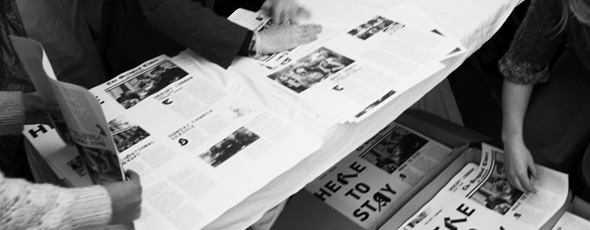
Catering For Change
To begin with, the kitchen at St Paul’s served up surprisingly good food, but as the occupation rumbled on, various ingredients were omitted in an attempt to cater for everybody.
First went the meat so that vegetarians were not excluded, then the use of spices was curtailed to cater for those who didn’t like anything too hot. Others didn’t like salt, and so on, until the excellent chef left, frustrated by the limitations. Eventually we ended up with notoriously bland, grey sludge which appealed to nobody, including the vegetarians and people who didn’t like salty or spicy food. This was no great disaster, and the food remained edible and plentiful, with meat and spice eventually put back on the menu, but it provides an analogy for the ‘outreach’ strategy adopted by Occupy in London.
The attitude was often “we can’t do or say anything too radical because it will alienate the public,” but if you worry all the time about scaring people away you end up with bland, empty platitudes which appeal only to those relatively comfortable with the status quo, and fail to address people’s grievances.
Inspiring Participation
Movement building should not be about chasing numbers to eventually reach a critical mass who can then make radical change. Of course, change is the ultimate goal, but change isn’t just the destination, it’s also the vehicle. By understanding and addressing people’s grievances, we show that another way is possible, while highlighting the exploitative nature of governments and inspiring resistance against a politics people never voted for and have no hand in carrying out.
What is happening at Friern Barnet, where activists have joined with locals to liberate their library lost to cuts, is truly inspiring. Local residents are fully behind the occupation, and teachers are taking pupils along to visit. This is a great example of people directly confronting the consequences of the neoliberal agenda, not just symbolically, but in a practical way with immediate and obvious benefits to the community. Reopening closed libraries and youth centres across the country would not only win allies and improve lives; it would create a real sense of people taking power back.
Of course, to fundamentally change a system a critical mass of people is needed, but if you put too much emphasis on numbers, and in so doing appeal to already populist ideas, then you just end up repackaging the status quo, which won’t change anything.
Successful movements don’t have to encompass a vast majority to be effective. There’s already a movement including everybody: the world exactly as it is now. If Occupy in London could have received the support of every Guardian reader it would have been a real force to be reckoned with. But it’s important that when previously non-politicised people join a movement the act of doing so requires a significant shift in perspective, or is part of a wider, ongoing shift.
Radical/Liberal Alliance
Liberals seeking change need to remember that radicals are asking for everything they want and more. Strategically, liberals should back the more ambitious demands of radicals, even if they don’t want to go as far. If liberals veto radical ideas and rhetoric – as the word ‘capitalism’ was blocked from a so-called Occupy Global Manifesto – then the radicals are effectively excluded, whereas a liberal agenda could be encompassed and realised through more radical ambitions.
As Stavvers explains, taking aims and demands to the extreme means lesser aims are more likely to be realised. Just as Malcolm X made MLK look like a more palatable option, radicals can make what liberals want seem more feasible. But this requires that movements resist adopting liberal messaging at the expense of radical ideas and analysis.
Preparing for Opportunity
Golden Dawn are making themselves relevant in Greece by opportunistically replacing services like security and even childcare, winning favour with people who have never held fascistic views. We can do the same, but we would be creating what we want to see, rather than merely exploiting people’s needs.
We should also understand the importance of good analysis. Theory and action are not competing factors, and demonstrations that are not underpinned by a meaningful critique or articulating real aims, demands or desires can be energy-sapping without much gain, while giving the state a chance to appear ‘tolerant’ by allowing them to happen.
Symbolic protests can be toothless, but not because they are symbolic. They are toothless because their symbolism fails to highlight the difference between people’s values and the government’s agenda, and the point at which the two clash.
Activists should not focus on winning the support of a corporate media invested in preserving the status quo, they should work to replace it. A movement needs to be fostered over time, through networks, dialogue, mutual aid and acts of solidarity.
Capitalism is doing a very good job of discrediting itself. We need to focus on what we’d like to retain of the society we now see around us, whilst refining alternative visions so we have ideas and practices to thrust into the vacuum when the system becomes untenable.
By Steven Maclean (@Steven_Maclean)









